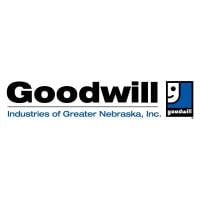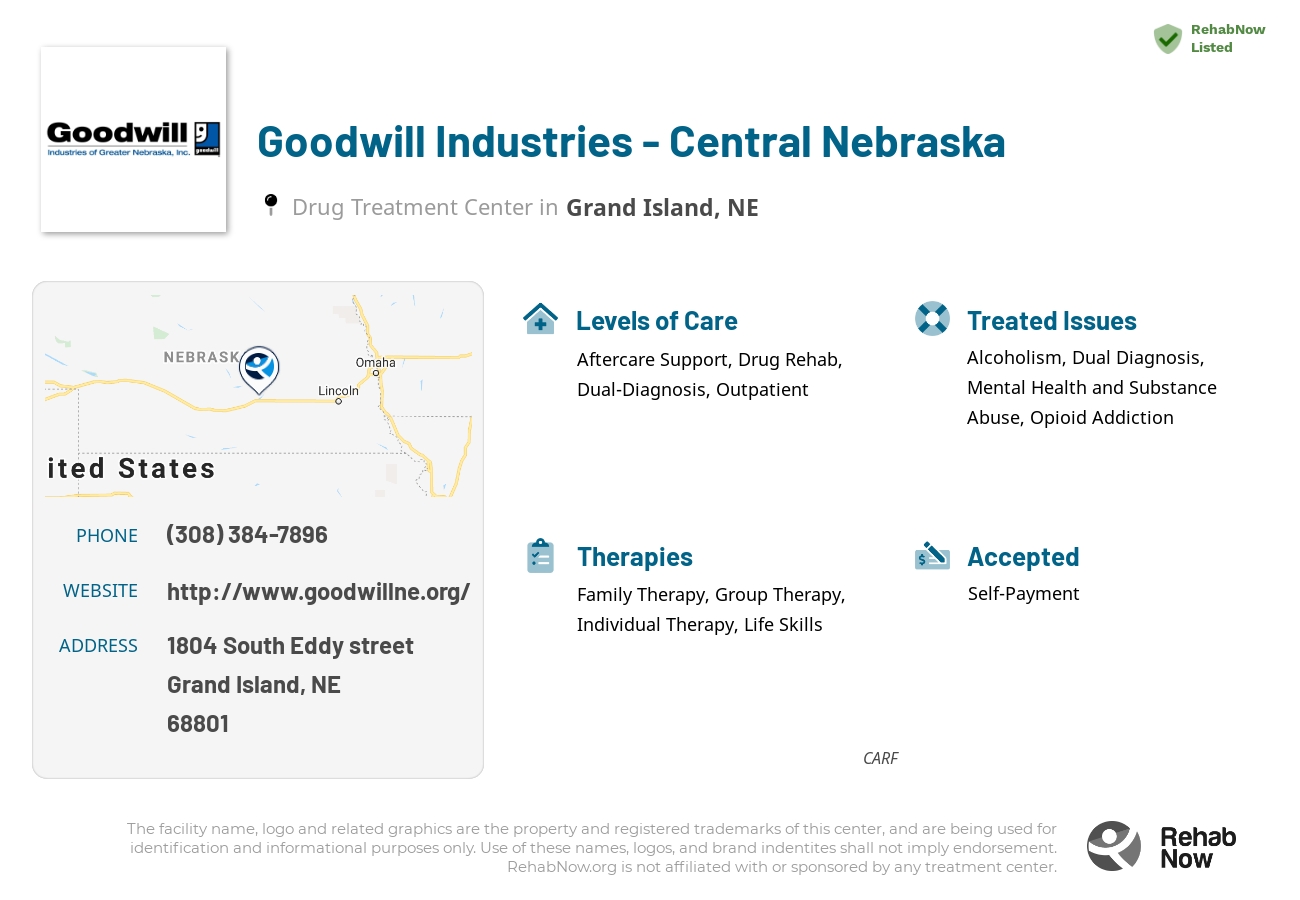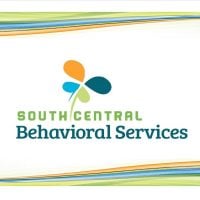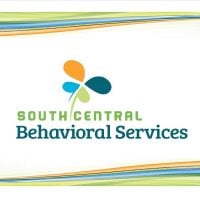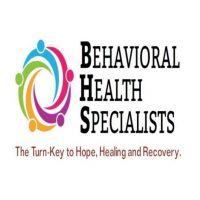Goodwill Industries - Central Nebraska
Drug Rehab Center in Grand Island, Nebraska
Goodwill Industries - Central Nebraska provides substance abuse treatment, mental health services and community-based services, offering outpatient services such as intake evaluations, individual and family counseling, and peer support services, as well as group counseling, educational classes, and other programs to help individuals and families suffering from addiction and substance abuse.
About This Nebraska Facility
Goodwill Industries - Central Nebraska in Grand Island, Nebraska is a non-profit organization providing substance abuse treatment, mental health services and community-based services. They provide outpatient services such as intake evaluations, individual and family counseling, and peer support services. They also offer group counseling, educational classes and other programs to help individuals and families suffering from addiction and substance abuse.
Goodwill Industries - Central Nebraska's substance abuse treatment program focuses on helping individuals and families create a healthy lifestyle. They provide comprehensive treatment services including cognitive-behavioral therapy, relapse prevention, and aftercare planning. In addition, they offer education on the risks associated with substance abuse and provide support and rehabilitation through group counseling sessions and one-on-one counseling.
Goodwill Industries - Central Nebraska is accredited by the Nebraska Substance Abuse Addiction and Mental Health Association (NSAMHA). They are also licensed by the State of Nebraska and have been awarded the "Three Star" Quality Status from the National Council for Accreditation of Addiction and Mental Health Services (NCAAMHS). Their staff is trained in evidence-based practices and specialize in providing comprehensive and comprehensive care for individuals and families affected by addiction.
Genders
Ages
Modality
Additional
Accreditations

CARF
The Commission on Accreditation of Rehabilitation Facilities (CARF) is a non-profit organization that specifically accredits rehab organizations. Founded in 1966, CARF's, mission is to help service providers like rehab facilities maintain high standards of care.
Conditions and Issues Treated
Many people who struggle with opioid addiction need to attend specific programs like methadone , Suboxone or Vivitrol clinics.
These types of programs will provide the patient with legal, prescription medications that can help them overcome their cravings for illegal opioids like heroin or fentanyl . If the patient has a chronic condition like Hepatitis C, they must undergo treatment before they can begin taking these medications.
Dual Diagnosis refers to someone who is both dealing with addiction and another mental health issue.
There are different kinds of Dual Diagnosis: A person who simultaneously experiences both a mental illness and an addiction disorder. Or, a person who experiences one or more coexisting (simultaneous) mental health conditions in addition to a primary substance use disorder.
Some conditions that commonly co-occur with addiction include:
- Personality Disorders (Borderline, Narcissistic)
- Mood Disorders (Bipolar Disorder, Depression, Anxiety Disorder)
- PTSD (Post Traumatic Stress Disorder), OCD (Obsessive Compulsive Disorder), ADHD (Attention Deficit Hyperactivity Disorder)
- Schizophrenia, Psychosis, Hallucinations, Delusions
Levels of Care Offered at Goodwill Industries - Central Nebraska
This center offers a variety of custom treatment tailored to individual recovery. Currently available are Aftercare Support, Drug Rehab, Dual-Diagnosis, Outpatient, with additional therapies available as listed below.
Outpatient treatment programs provide drug and alcohol addiction treatment through individual sessions with a counselor, group therapy, 12-step meetings, and other activities to help individuals gain sober living skills. Most programs are designed for those individuals who have completed a medically supervised detoxification program and provide opportunities for clients to begin the process of early recovery.
Outpatient programs also offer a level of medical support as needed and psychological backing through therapy. Clients are encouraged to live at home, though there may be some flexibility regarding this requirement based on the circumstances and needs of each patient.
Outpatient treatment is perhaps the most common type of dual diagnosis program available. It does not pose a significant financial burden on patients. However, it is essential to note that outpatient treatment does not provide the support and supervision given in residential programs. Some addicts may need this level of support to maintain their sobriety.
People who have completed a rehab program often need continued support from the addiction treatment team in order to remain abstinent from drugs and alcohol. Aftercare can be beneficial for personal, social, and emotional growth.
Common aftercare options include:
- Individual Therapy – this type of addiction counseling is available on a one-on-one basis. This can be beneficial for people with a high degree of emotional turmoil and a strong desire to overcome addiction.
- Group Therapy – this type of addiction counseling is available in a group setting. This type of treatment can be beneficial for people who are unable to attend regular therapy appointments due to other responsibilities.
- Family Therapy – this type of addiction counseling is available to the family members of addicts. This can be beneficial for people who are unable to fully comprehend what their loved ones are experiencing due to addiction.
Therapies & Programs
Therapy sessions focused on the individual addict can provide much-needed guidance as they work toward overcoming their addiction. These types of sessions typically involve guidance from a therapist, who will help addicts identify and process their feelings and cravings.
During these sessions, addicts may develop plans for coping with the triggers that typically lead to relapse and learn how to avoid those triggers during their recovery process.
The main goal of family therapy for drug addiction is to create an environment where communication can occur without judgment, hostility, or blame that often occurs within a family.
Family therapy is a type of group problem-solving that aims to improve communication and relationships between the patient, their family, and sometimes friends. The therapist is with the family as they learn to communicate with each other differently, especially with the addict when s/he is using.
The family can learn to reduce their enabling behavior or rally together and support each other during tough times. The patient also learns how to deal with their addiction and maintain sobriety while interacting with the family.
Different types of addiction treatment services are available. Within this article, group therapy is of interest due to its high success rate compared to individual therapy. Group therapy settings are beneficial because they allow recovering addicts to build a strong support network.
Benefits of group therapy are:
- Reduces feelings of isolation
- Immediate access to social support in the form of fellow addicts in recovery
- Lowers risk of relapse
- Increases rate of sobriety
- Builds coping skills that can be applied to everyday life
Those struggling with addiction in Nebraska can benefit from learning certain life skills. It is not as simple as quitting drinking or taking drugs and thinking that the hard part is over. Being sober means living a whole new way of life. Many recovering addicts have found that they need to develop talents like time management, organization, communication skills, socialization skills, and self-esteem to make their life in sobriety work.
Drug and alcohol addiction can lead to a breakdown in life skills. Learning certain life skills can help those who are struggling with addiction. Life skills training at Goodwill Industries - Central Nebraska in Grand Island, NE teaches patients skills such as time management, budgeting, and social abilities to improve their quality of life and prevent relapse.
An addict’s life skills are maladaptive, meaning they are counterproductive. An addict may have learned poor time management skills growing up, have a hard time budgeting money, or be socially awkward. An addict’s poor life skills can lead to relapse and the inability to achieve long-term sobriety. Life skills training teaches patients effective coping mechanisms, which can help them live a clean and sober life.
Payment Options Accepted
For specific insurance or payment methods please contact us.
Goodwill Industries Associated Centers
Discover treatment facilities under the same provider.
Learn More About Goodwill Industries Centers
Additional Details
Specifics, location, and helpful extra information.
Grand Island, Nebraska 68801 Phone Number(308) 384-7896 Meta DetailsUpdated November 25, 2023
Staff Verified
Patient Reviews
There are no reviews yet. Be the first one to write one.
Grand Island, Nebraska Addiction Information
Despite a total population of slightly less than 2 million residents, methamphetamines are one of the most commonly abused illicit substances in the state. Alcohol abuse is so common that a news article once referred to Nebraska as "America's 9th drunkest state". Although opioid abuse rates in Nebraska are not as high as those in other states, opioids are still involved in most overdoses.
Grand Island has seen its fair share of opioid abuse and heroin addiction problems. Over 70 people die every year due to overdosing on drugs on Grand Island. In addition, the average age of first-time alcohol use among children is 13.3 years old. Some of the most common types of drugs used in Grand Island, NE are marijuana, prescription medications, and heroin.
Treatment in Nearby Cities
- Macy, NE (132.5 mi.)
- Sidney, NE (242.5 mi.)
- Lincoln, NE (86.0 mi.)
- Geneva, NE (47.0 mi.)
- Beatrice, NE (94.7 mi.)
Centers near Goodwill Industries - Central Nebraska
The facility name, logo and brand are the property and registered trademarks of Goodwill Industries - Central Nebraska, and are being used for identification and informational purposes only. Use of these names, logos and brands shall not imply endorsement. RehabNow.org is not affiliated with or sponsored by Goodwill Industries - Central Nebraska.
